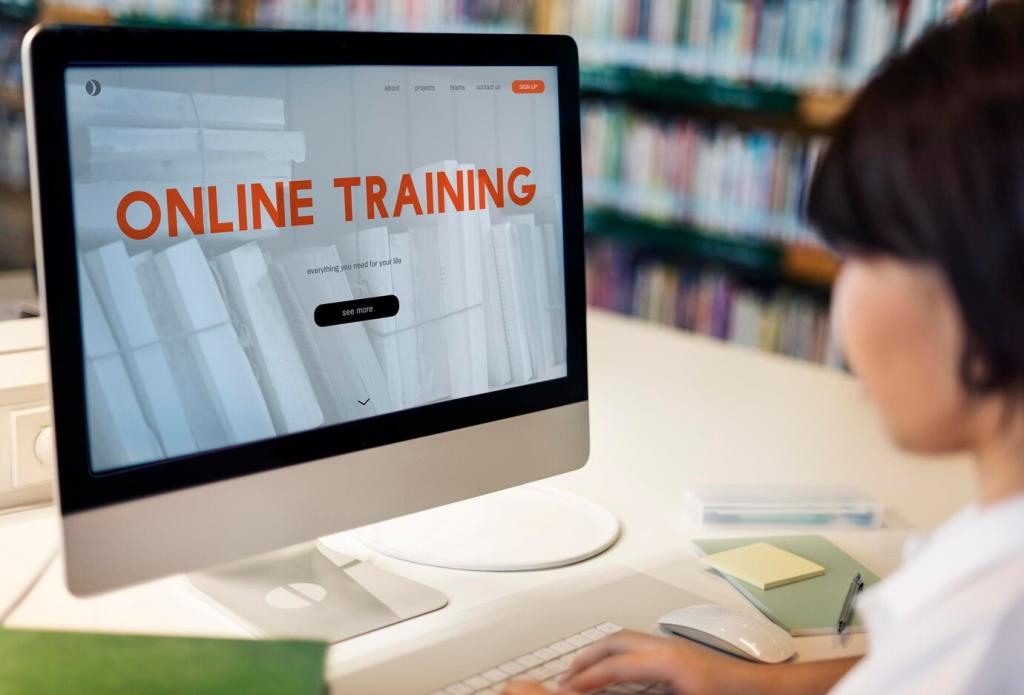Level Up Learning: Gamification in IT Online Courses
Chosen theme: Gamification in IT Online Courses. Discover how playful mechanics, narrative quests, and meaningful feedback transform complex technical topics into engaging, memorable learning journeys. Join our community, share your wins, and help shape our next challenge.

Why Gamification Energizes IT Learners
Points are useful, but meaning matters more. Tie badges to real competencies, like debugging depth or architectural reasoning. When learners understand why progress matters, engagement persists long after the novelty of glittering icons fades.
Why Gamification Energizes IT Learners
Break big skills into tiny victories: one regex, one test, one refactor. Quick feedback and steady pacing create flow. Learners experience forward momentum without overwhelm, stacking small successes into confident, durable technical mastery over time.
Skill trees aligned to real competencies
Design a skill tree where branches mirror actual developer pathways: testing, data modeling, observability, security. XP unlocks labs and code reviews, rewarding deliberate practice. Learners choose routes, building autonomy while the curriculum quietly ensures comprehensive coverage.
Quests, sprints, and acceptance criteria
Turn lessons into sprint-sized quests with clear acceptance criteria, test suites, and optional stretch goals. Learners feel like contributors shipping features. The ceremony of planning, standups, and retros builds both technical fluency and collaborative, professional habits.

A world with believable constraints
Place learners in a fictional fintech startup or observability team with realistic SLAs, budgets, and compliance rules. Constraints anchor decisions, making trade-offs meaningful. The story becomes a safe playground for practicing judgment before real-world consequences appear.

Characters that mirror developer growth
Mentors, teammates, and demanding stakeholders become characters with clear goals and personalities. Their feedback, code reviews, and blockers create emotional stakes. Learners empathize, practice communication, and internalize the soft skills that often decide project outcomes.

Episodic arcs for retention
Structure learning as episodes with cliffhangers: a mysterious outage, a security audit, an urgent rollback. Each episode revisits prior concepts while introducing one new twist, reinforcing memory through narrative callbacks and intentional repetition with purpose.
Fair, Accessible, and Ethical Game Systems
Leaderboards without shame
Use tiered leagues, personal bests, and cooperative goals to avoid demotivating newcomers. Celebrate improvement and consistency, not just raw speed. Private progress dashboards help learners focus on personal growth rather than performative competition alone.
Integrity and anti-cheat with learning in mind
Design integrity checks that encourage learning: randomize parameters, require short reflections, and include peer code walkthroughs. Emphasize understanding over enforcement. When the system explains why integrity matters, most learners happily align with the standard.
Accessibility as a first-class mechanic
Support multiple input modes, dyslexia-friendly fonts, captions, screen reader compatibility, and color-safe palettes. Offer time-flexible challenges and adjustable difficulty. Accessibility is not a feature; it is the core rule that keeps every player in the game.


Technology Stack for Gamified Delivery
Connect XP, badges, and progression to your LMS via webhooks or LTI. Automate enrollment unlocks, send event streams to dashboards, and synchronize rosters. The plumbing should disappear so instructors focus on crafting meaningful challenges.
Technology Stack for Gamified Delivery
Collect actionable, minimal data: attempts, hints viewed, errors fixed, time-on-task bands. Aggregate trends to improve pacing and content clarity. Be explicit about retention windows, opt-outs, and anonymization so trust stays stronger than any leaderboard.
Community, Collaboration, and Healthy Competition
01
Form small squads that share goals and rotate roles: driver, navigator, tester, documentarian. Cooperative quests reward communication and shared accountability. Social glue reduces attrition and turns solo grind into shared momentum and thoughtful peer learning.
02
Weekly speedrun refactors, bug bounty nights, and demo days transform learning into rituals. Predictable cadence builds anticipation and belonging. Rituals also create natural checkpoints for reflection, feedback, and course tuning based on lived experience.
03
Invite mentors who appear as narrative guides, offering hints rather than answers. Their office hours become unlockable side quests. Learners feel supported without losing agency, and mentors gain structured touchpoints to model professional judgment.
